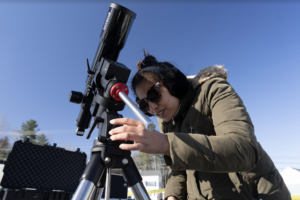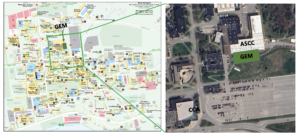The most recent segment of the University of Maine’s 2023 Socialist and Marxist Studies Series welcomed Associate Professor of Sociology Michael Haedicke to present his latest research on Thursday, Nov. 30. He is also the George J. Mitchell Center for Sustainability Solutions Faculty Fellow.
Thursday’s talk, titled “Place and Case Frames for Climate Adaptation Research,” comes shortly after the release of the Fifth U.S. National Climate Assessment on Nov. 14, 2023. Haedicke described these assessments as “periodic reports that review the state of climate science and outline the current and projected future impacts of climate change within the United States.”
Raymond Zhong, a climate reporter for The New York Times, summarized the grim outlook of the report soon after it was made available for public viewing, writing, “The food we eat and the roads we drive on. Our health and safety, our cultural heritage, natural environments and economic flourishing. Nearly every cherished aspect of American life is under growing threat from climate change and it is effectively too late to prevent many of the harms from worsening over the next decade.”

Haedicke’s talk also proved timely in the sense that it occurred on the first day of the two-week long 2023 United Nations Climate Change Conference, also known as the Conference of the Parties of the UNFCCC (COP28), in Dubai. He recognized the timeliness of this event but stated, “It’s not particularly inspiring that the President of this year’s conference (Sheikh Mohammed bin Rashid Al Maktoum) is also the CEO of the UAE’s largest state-owned petroleum company.”
In relating these recent and ongoing events to his own research, Haedicke discussed the different approaches to dealing with climate change: mitigation and adaptation. According to Haedicke, while mitigation “refers to actions to alter human activities, mainly the consumption and use of fossil fuel energy sources, which are the primary drivers of climate change,” adaptation instead focuses on “steps that can be taken to reduce negative impacts of climate-related hazards on human welfare and on social institutions.”
A challenge of adaptation, which Haedicke seeks to examine with his current research on efforts to minimize and stabilize coastal land loss in southeastern Louisiana, is that it is impossible to know exactly what will happen in the future in terms of climate change. Louisiana has now implemented a 50-year, $50 billion plan to save its struggling coastline, as projections see the state potentially losing another 715 square miles of land over this same time period. Since 1932, the state has lost approximately 1,900 square miles of its coastline.
Haedicke explained that Louisiana’s 2023 Coastal Master Plan “involves constructing a series of diversions along the Mississippi River, which are essentially…engineered breaks in the levy that will allow controlled flooding into wetlands so the river can return again to depositing silt in those areas…The intention is that this will replicate natural processes that have sustained land and reduce the extent of land loss in the future.”
Although the science behind these planned measures has not ever been tested, advocates of the project are hopeful that it will effectively work to prevent, limit, and even rebuild some coastal land loss, which “amplifies climate-related hazards in this part of the country.” Haedicke added, “Coastal flooding from hurricanes is worsened when the wetlands that would otherwise buffer the storm surge coming in from the ocean no longer exist.”
Professor Haedicke plans to continue compiling and analyzing his research on climate adaptation efforts in Louisiana with the intent of eventually releasing it as a book.
To learn more about Louisiana’s climate adaptation efforts and the inspiration behind Professor Haedicke’s ongoing research, visit https://coastal.la.gov/our-plan/2023-coastal-master-plan/.
The Socialist and Marxist Studies Series is co-sponsored by the Maine Peace Action Committee and the Division of Student Life, with support from the College of Liberal Arts and Sciences and the Department of Philosophy.













